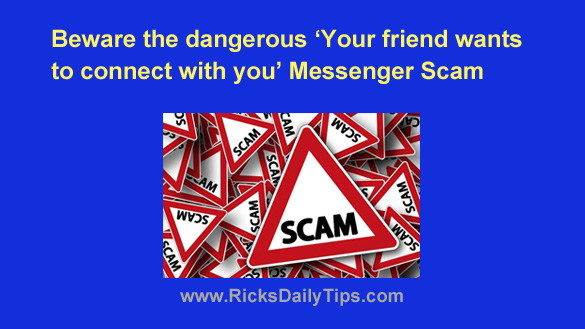 As you probably know, Facebook is a favorite playground for scammers and hoaxsters.
As you probably know, Facebook is a favorite playground for scammers and hoaxsters.
It seems like a new scam or hoax pops up on a daily basis while others seem to come and go like the tides.
Right now a very dangerous recurring scam is once again targeting Facebook Messenger users.
The actual scams being perpetrated vary quite a bit but most of them typically work something like this:
1 – A scammer either hacks into a user’s account or simply copies a few photos and some info from the account and clones it.
2 – The scammer uses the hacked or clone account to send fraudulent instant messages to all of that person’s friends via Facebook Messenger.
If the fraudulent message was sent from a hacked account it will simply show up in the recipient’s inbox just like any other message that was sent from a friend. In cases like this the recipient will typically just open the email and read it.
However, if the message was sent from a fake clone account the recipient will receive a message stating “John Doe wants to connect with you.“
In most of these cases the recipient will recognize the “sender” as a Facebook friend and click the “Accept” button to read the message. The problem is while the person who appears to be the sender is a friend, the account the message was actually sent from is a fake.
We know this because you are asked to “Accept” the message (you never have to “accept” a message from someone you are friends with. It will simply land in your inbox).
There are a couple of things you need to do to stay safe from these malicious instant messages:
1 – Treat every message you receive in your Facebook IM inbox as a potential scam or hoax, even if it lands in the inbox without you having to “accept” it.
Read the message carefully and ask yourself “Is this something that I could expect this friend to send in an instant message?” If the answer is no, either delete the message without acting on it or contact your friend and ask what’s going on.
2 – Treat every “John Doe wants to connect with you.” message you receive as fraudulent if it appears to have been sent by someone you are already friends with.
When someone you’re friends with sends you an instant message you won’t have to “accept” it. It’ll simply land in your inbox and be ready for you to read immediately.
The “John Doe wants to connect with you” message indicates that it was sent from an account that is NOT on you friends list. Therefore, receiving such a message from one of your friends should raise a huge red flag because it had to have been sent from a fake clone account.
Bottom line: It’s more important than ever to be extremely careful when deciding how to respond to instant messages you receive via Facebook Messenger. One “bad click” could ruin your whole day.
Bonus tip: This post explains how to protect your Facebook account from hackers.
Never miss a tip! Click here to sign up for my free Daily Tech Tips Email Newsletter!